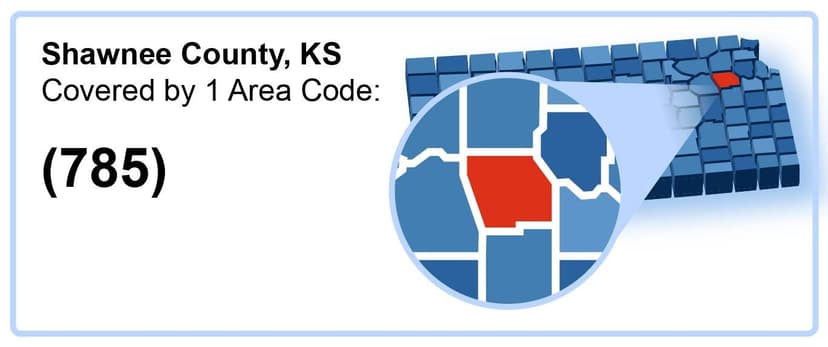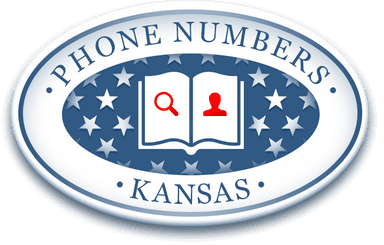What are Shawnee County Area Codes?

The establishment of the North American Numbering Plan (NANP) led to the allocation of area codes to different Numbering Plan Areas (NPAs) in North America. Shawnee County area code is the three-digit numeric prefix that makes up a ten-digit phone number registered within the county. The Kansas Corporation Commission introduces and manages area codes in the state.
Presently, Shawnee County has only one active area code (785).
Area Code 785
Created from a split of the 913 NPA in 1997, area code 785 is the Kansas telephone area code that initially served all of northern Kansas. It currently serves Topeka and other northeastern parts of the state. Shawnee County cities and communities covered by the 785 NPA code include Auburn, Roseville, Silver Lake, Willard, Soldier, Wakarusa, Doer, Grove, Williamsport, and Elmont.
What are the Best Cell Phone Plans in Shawnee County?
Besides Sprint, America’s principal phone carriers offer impressive network coverage in Shawnee County. AT&T has a network spread of 99.9% and closely followed by Verizon at 99.8%. T-Mobile provides reliable service and covers 91.9% of the county. Sprint comes at a distant last, offering only 24.6% coverage. Sprint, however, compensates for the low coverage by maintaining roaming agreements with other networks to ensure their customers remain connected.
Statistics from a 2018 NCHS research show that Kansans are shifting from landline telephony services to wireless services massively. Residents above 18 years who used only wireless services made up 64.4% of the total adult population, while 3.4% of them were exclusive users of landline phones. Similarly, 77.2% of the children population relied solely on cell phones for telecommunications compared to the 0.7% who lived in landline-only households.
Rapid internet growth and advances in telephony technology contributed to the widespread adoption of Voice over Internet Protocol (VoIP) for telephony services in Shawnee County. VoIP routes phone calls over broadband internet connections and is not limited by phone users’ locations. Residents find VoIP’s cheap call rates a great alternative to regular telephone services for local and long-distance communications.
What are Shawnee County Phone Scams?
Shawnee County phone scams are cunning tricks designed to fool county residents into paying money or sharing confidential information over the phone. Phone scams are often committed using telephony services such as voice calls, text messages, and automated calls. Fraudsters usually use caller ID spoofing to mask their identities and pose as representatives of trusted and familiar institutions when targeting unwary residents for scams. However, performing reverse phone lookups on unknown phone numbers can help residents obtain answers to “who called” and “who is this number registered to?” Residents can file reports of phone scam incidents with the Shawnee County Sheriff’s Office and the Kansas Attorney General’s Office.
The following phone scams are prevalent in Shawnee County:
What are Shawnee County Government Grant Scams?
Scammers often initiate these scams with classified online ads for bogus government grants. They use the bait of free money to lure unwary Shawn County residents into calling certain toll-free numbers to take advantage of such fake government grants. These scammers then ask their marks to provide bank information to facilitate the direct deposits of the grants. In another version of this scam, fraudsters call their targets to inform them that they qualify for government grants, spoofing phone numbers of actual government agencies. They may also make up official-sounding names of fictitious government agencies to fool their marks. In most cases, scammers ask their marks to make upfront payments as a prerequisite to accessing these grants via preloaded cards, gift cards, or wire transfers. The Kansas Attorney General’s Office warns residents never to pay fees to secure grants. Legitimate government entities will never demand payments from residents through odd payment methods. Shawnee County residents can use free reverse phone lookup tools to query the phone numbers of suspicious callers who offer them these types of opportunities.
What are Shawnee County Computer Repairs Scams?
In this scam, fraudsters claim to work for reputable computer companies and inform their marks that viruses have infected their computers. They offer to resolve the problems by asking permission for remote connections into their marks computers. They, however, have no intentions of fixing such computers; instead, they install malware that combs their victims’ computers for confidential information. These scammers usually block their victims out of the computers until payment for their fake services is made. In other instances, the scammers may install spyware to take over their victims’ computer cameras, keyboards, and microphones. Doing this enables them to keep tabs on their victims and collect more confidential information for future scams. Services that provide reverse phone lookups can retrieve identifying information on these scammers and expose them. Never grant remote access to your computer if asked by callers claiming to be with familiar computer companies. Instead, search online for the manufacturer’s official website and use their customer service number provided to request repair services if required.
What are Shawnee County Government Imposter Scams?
These are various impersonation attempts in which scammers pose as representatives of different public agencies, including federal, state, and local government institutions. Although these scams have several variants, their main aim is to gain the trust of their targets and convince them to send money, share confidential information, or both. Scammers may pretend to be IRS employees and ask Shawnee County residents to make immediate payments for unpaid taxes or face arrests. In another variation, they impersonate staff of the Kansas AGO and threaten with arrests if they fail to comply with their requests. These scammers usually use irregular payment methods such as credit cards, prepaid debit cards, wire transfers, and gift cards. Shawnee County residents can uncover imposters’ identities by running their phone numbers through free reverse phone lookup search engines. Residents are reminded to confirm the authenticity of unknown callers’ claims by calling the official phone numbers of the government agencies they claim to represent.
What are Robocalls and Spam Calls?
A robocall is any phone call that uses an automated dialing device to deliver a pre-recorded message to several phone numbers at the same time. It has the distinctive feature of sounding like a robot but can also be re-configured to create the impression that a real person is calling. Robocalls are mostly recognized for their use in political campaigns and the delivery of time-sensitive routine notifications such as doctor’s appointments and school updates. They also serve other legitimate roles for businesses and organizations involved in real estate, direct sales, and telemarketing. Spam calls are mostly illegitimate and are irrelevant calls placed randomly to phone users who are not interested in them.
Scammers’ widespread abuse of robocalls has earned this technology a dubious reputation as they are now generally perceived as potent scam tools. A scammer can leverage robocall technology to mass-deliver a single fraudulent message to multiple recipients in any part of the globe at a relatively affordable rate. Fraudsters can hide their identities using spoofed robocalls. In Shawnee County, robocall scammers effectively use robocalls to identify potential scam targets and elicit confidential information from unwary residents. They can, however, identify inbound robocalls with the aid of applications that provide reverse phone searches free of charge. The following tips can help you properly respond to automated calls and guard against robocall scams:
- Do not speak when you mistakenly answer a robocall. Resist the urge to select a key or engage in any conversation with a representative. This will only increase a scammer’s chance of obtaining confidential information from you.
- Do not answer calls from unknown numbers and end a call immediately you hear a recorded message. Note that scammers usually spoof robocalls to display the phone numbers of familiar businesses. Reverse phone lookup tools can help you identify them and avoid scams.
- Add your phone number on the National Do Not Call Register. The FTC restricts telemarketers from calling phone numbers listed on the registry, thereby making it easy to identify illegal robocalls. Interested residents can register their phone numbers online or by calling 1 (888) 382 1222 with the number(s) they wish to enlist.
- File complaints of robocall violations with the FTC online or by calling 1 (888) 382 1222. You can also call 1 (888) 225-5322 to submit reports of unwanted automated calls to the FCC.
- Ask your phone provider for free call-blocking services to screen out and filter unwanted spam calls. Third-party call-blocking services are also helpful in this regard and are usually available for download from online mobile stores.
Shawnee County residents can learn how to block robocalls on any platform from the FTC’s website.
How Can You Spot and Report Shawnee County Phone Scams?
Scammers continually craft deceptive ploys and use sophisticated tools to defraud Shawnee County residents and stay out of the grasp of law enforcement. They often outwit county residents, convincing them that they are harmless. Scammers usually impersonate legitimate businesses and institutions that residents trust and entice them with overly attractive offers. Consumer education and alertness remain effective defenses against phone scams. Applications providing good reverse phone search services can help residents avoid phone scams.
The indicators that a phone call is a scam call include:
- Scammers are generally evasive and usually ignore inquiries for identifying information or details that may cause their cover to be blown.
- Scammers usually make unsolicited contact out of the blues via phone calls, text messages, or automated calls.
- Fraudsters are fond of demanding confidential information for supposed verifications. Requests for information such as account passwords, credit card numbers, PINs, social security numbers, and birth dates are major red flags of phone scams.
- Scammers typically demand upfront payments. Fraudsters often promise their targets attractive offers such as loans, gifts, investments, contracts, lottery winnings, and shares of inheritance to lure them.
- If an unknown caller uses threats to force you to do their bidding, such as sending money or sharing information, then it is a scam. Fraudsters favor pressure methods and often use them to create a sense of urgency.
- Scammers have a preference for receiving payments via irregular channels. To avoid detection and make it difficult for law enforcement to uncover their tracks, phone crooks instruct their targets to send money using untraceable channels. Cryptocurrency, preloaded debit cards, iTunes gift cards, wire transfers, and prepaid cards are typical examples of these preferred payment methods.
Having a good knowledge of how phone scammers operate can help Shawnee County residents identify potential scams before they occur. Services that offer phone number lookups by name and address also offer reliable alternatives to retrieving scammers’ identities. Some government agencies provide consumer protection information and combat the scourge of phone scams in Shawnee County. These include:
Shawnee County Sheriff’s Office: This agency provides law enforcement services and ensures that residents are protected in the county. They also help residents stay alert to scams by publishing regular scam notifications and investigating fraud. Shawnee County residents who are scam victims can file reports with the Sheriff’s Office by calling 1 (785) 251-2200.
Federal Trade Commission: The FTC manages the National Do Not Call Registry, a database of phone numbers exempted from unwanted robocalls. Shawnee County residents can file complaints of robocall violations and other phone scams with the FTC by calling 1 (888) 382 1222.
Kansas Attorney General Office: The Kansas AGO, through its consumer protection division, protects consumers in the state from telemarketing fraud and other deceptive business practices. They also investigate phone scams perpetrated against Kansans. The AGO prosecutes violations against the Consumer Protection Act, the No-Call Act, and the Kansas False Claims Act. Kansas, who have suffered losses from phone scams, can submit complaints to the Kansas AGO online or call (785) 296-2215.
Federal Communications Commission: The FCC protects consumers from losses caused by phone spoofing scams and illegal robocalls. Residents of Shawnee County who are robocalls scam victims or have had their phone numbers spoofed can submit reports to the FCC online.
